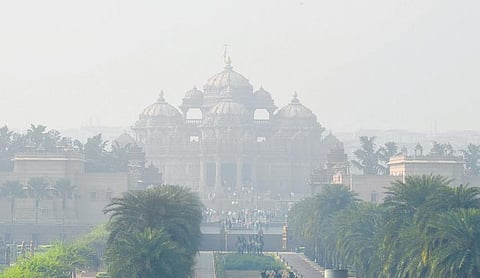

NEW DELHI: The national capital’s air pollution situation showed a slight improvement on Friday with the average Air Quality Index (AQI) recorded at 405, according to data from Central Pollution Control Board (CPCB).
The capital’s 24-hour average AQI, calculated at 4 pm every day, was 429 on Thursday. It was 401 on Wednesday, 397 on Tuesday, 358 on Monday, 218 on Sunday, 220 on Saturday, and 279 on Friday.
Meanwhile, neighbouring Ghaziabad (374),Gurugram (404), Greater Noida (313), Noida (366), and Faridabad (415) also recorded ‘very poor’ to ‘severe’ air quality.
The relatively better air quality last weekend was attributed to rain. Air pollution levels surged in the following days due to intense firecracker bursting on Diwali night and resurgence in stubble burning in the neighbouring states. These effects were compounded by unfavourable meteorological conditions, primarily calm winds and low temperatures, hindering the dispersion of pollutants.
An AQI between zero and 50 is considered good, 51 and 100 satisfactory, 101 and 200 moderate, 201 and 300 poor, 301 and 400 very poor, 401 and 450 severe and above 450 severe plus.
According to IQAir, a Swiss company that specialises in air quality monitoring, Delhi was the most polluted city in the world on Thursday, followed by Baghdad and Lahore.
According to health experts, breathing in the polluted air of Delhi is equivalent to the harmful effects of smoking approximately 10 cigarettes a day. Prolonged exposure to high levels of pollution can cause or exacerbate respiratory problems such as asthma, bronchitis and chronic obstructive pulmonary disease (COPD) and dramatically raise the risk of cardiovascular disease, they added.
Earlier this week, Delhi environment minister Gopal Rai had mentioned the possibility of the return of the odd-even car rationing measure if AQI crossed the 450-mark.The measure, implemented four times since 2016, mandates private cars to operate on alternate days based on the odd or even last digit of their registration numbers. The scheme was last enforced in 2019.
However, the government last week postponed its implementation after the improvement in the city’s air quality due to the rain on Friday.Recent findings from a joint project by the Delhi government and IIT-Kanpur found that vehicular emissions accounted for about 38 per cent of the capital’s air pollution on Wednesday. This reduced to 25% on Thursday.